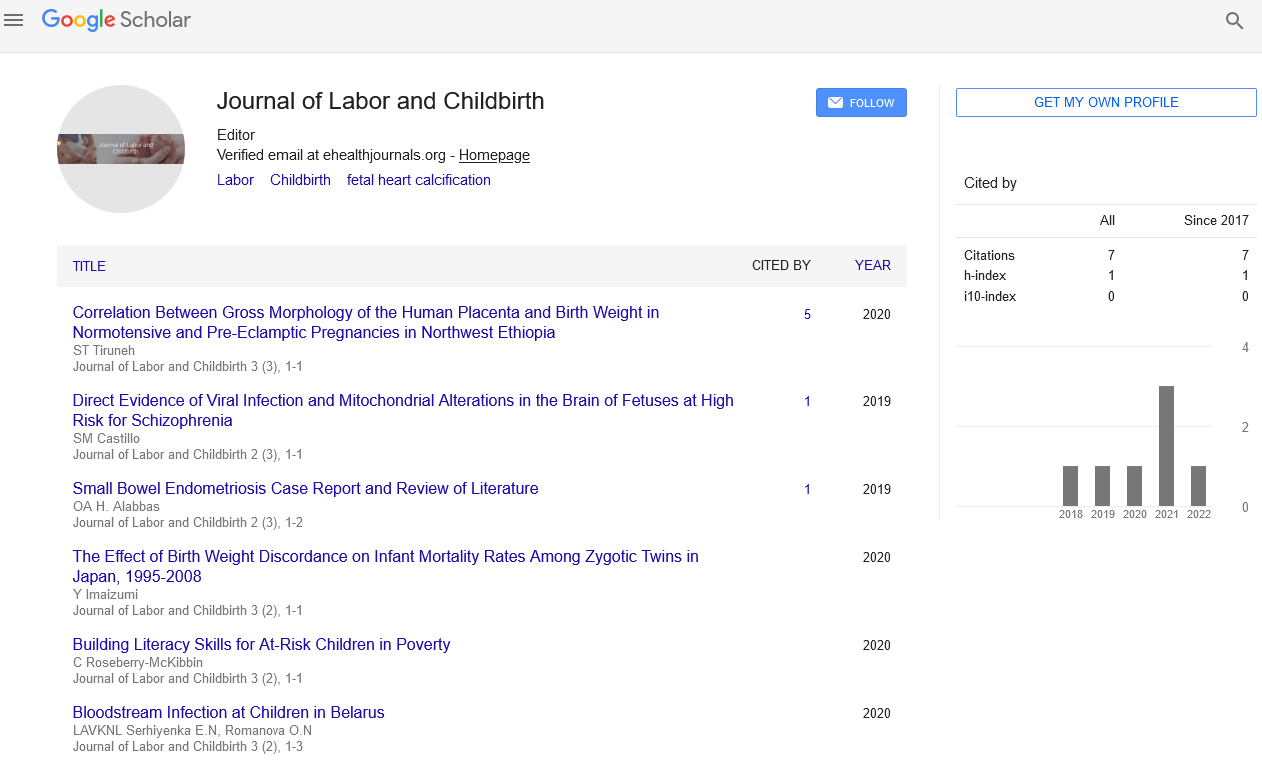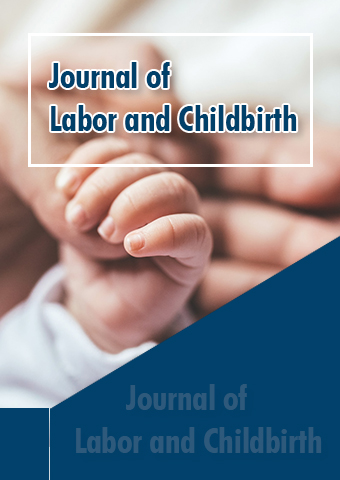Mini Review - Journal of Labor and Childbirth (2023) Volume 6, Issue 2
TNF-ñ/hostile to TNF-ñ medicates and its impact on pregnancy results
Joe Leo*
Department of Immunology, University of Bristol, UK
Department of Immunology, University of Bristol, UK
E-mail: leo@cardif.ac.uk
Received: 01-Apr-2023, Manuscript No. jlcb-23-96575; Editor assigned: 03-Apr-2023, PreQC No. jlcb-23- 96575(PQ); Reviewed: 17-Apr-2023, QC No. jlcb-23-96575; Revised: 20- Apr-2023, Manuscript No. jlcb-23- 96575(R); Published: 28-Apr-2023; DOI: 10.37532/jlcb.2023.6(2).061-063
Abstract
A complicated biological process is pregnancy. Crucial events include the creation and maintenance of the foetal maternal interface. The foetal maternal interface relies heavily on residual immune cells and inflammatory cytokines. Pregnancy outcomes are harmed when decidual immune cells fail to function properly. A common inflammatory cytokine known as Tumor Necrosis Factor (TNF) plays a crucial role throughout the normal pregnancy process. However, it is still unclear whether the TNF- disorder is associated with adverse pregnancy outcomes such as Preeclampsia (PE), Intrauterine Growth Restriction (IUGR), Spontaneous Abortion (SA), preterm birth, and others. In this audit, we completely explored the impact of TNF-α jumble on obsessive circumstances. Also, we summed up the reports about the unfriendly pregnancy results (PE, IUGR, SA and preterm birth) of utilizing hostile to TNF-α drugs (Infliximab, Etanercept and Adalimumab, Certolizumab and Golimumab) at present in the clinical examinations. In general, the most frequent adverse pregnancy outcomes of anti-TNF- drugs are IUGR, SA, and preterm birth. The immunological treatment of pregnancy related complications may benefit from the insights that our review may provide, as well as practitioners’ ability to make educated decisions based on the most recent evidence.
Keywords
Fetal maternal interface • Inflammatory cytokines • Tumor necrosis factor • Intrauterine growth restriction • Abortion
Introduction
The effective implantation of semi allograft incipient organisms into the endometrium of the parent body without being dismissed by the mother relies upon the support of provocative furthermore, invulnerable microenvironment of the fetal-maternal point of interaction. The foundation and upkeep of fetal-maternal microenvironment require the capability of insusceptible cells also, different cytokines. The capability of decidual insusceptible cells has been completely researched. However, it is still unknown what role inflammatory cytokines, particularly Tumor Necrosis Factor (TNF), play in the foetal maternal interface. In immunological and inflammatory conditions at the foetalmaternal interface, TNF is a crucial cytokine. TNF mediated moderate pro inflammatory and immune response in the first three trimesters of pregnancy and childbirth are responsible for embryo transfer, trophoblast cell function, and labor, while inhibitory inflammatory response in the middle and late trimesters of pregnancy is responsible for embryonic development. Preeclampsia (PE), Intrauterine Growth Restriction (IUGR), Spontaneous Abortion (SA), Preterm Birth, and other adverse pregnancy outcomes were all linked to an imbalance of TNF at the foetal- maternal interface, according to recent research [1].
TNF Alpha Related to Spontaneous Abortion
SA, which is defined as the loss of a natural pregnancy before 20 weeks, is one of the most common complications of pregnancy. The concluding section of SA is intricate and primarily consists of genetic, anatomical, endocrine, immune, infection related inflammation, and psychological factors. The prevalence of SA is rising annually as a result of a number of factors, including the influence of social and psychological factors, a change in lifestyle and an earlier age at which women can become pregnant. The particular mechanism hasn’t been fully understood yet. The connection between the TNF-alpha and SA has received a lot of attention in recent years [2, 3].
The unusual articulation of TNF-α is firmly connected with the event of SA. Examples include reported that the TNF- polymorphism is a genetic risk factor for SA, and that the TNF- -863C > A variant increases the risk of SA. Additionally, an increase in TNF- expression was associated with an increase in the rate of SA in pregnant mouse models. A growing number of studies indicate that SA is linked to abnormal maternal immune function caused by an imbalance in the Th1/Th2 and Th17/Treg ratios. In addition, the trophoblast, decidua, and maternal immune cells all engage in intricate interactions during a normal pregnancy. Additionally, TNF- influences decidualization and decidual cell function, thereby altering the microenvironment of the foetal-maternal interface and mediating abortion [4].
It was found that abortion decidual tissue with high levels of TNF- alpha can prevent embryonic stem cell differentiation and decasualization, preventing blastocyst implantation and/or pregnancy maintenance. The most recent findings that dNK cells exceptionally express TNF-α in immediately cut short tissues, and TNF-α prompts the up regulation of aryl hydrocarbon receptor articulation in dNK cells, subsequently upgrading the cytotoxicity of decidual Normal Executioner cells (dNK cells) and causing dNK cells to foster a safe reaction to baby, bringing about SA [5] .
In conclusion, the abnormal elevation of TNFexpression may have an impact on a number of crucial connections in the normal course of pregnancy. By influencing the balance of Th1/Th2 and Th17/Treg cells, endometrial decidualization, the cytotoxicity of dNK cells, and the function of decidual stromal cells, TNF- mediates the occurrence of SA. Women of childbearing age will benefit from additional in depth research into the specific mechanism of TNF-mediated SA [6, 7].
TNF Alpha Associated Preterm Birth
Premature birth, on average, has a negative impact on the health of premature infants and places a burden on their families as well as society. Genetic factors, inflammation, and immunity are all linked to preterm birth. One of the factors that contribute to premature birth is premature membrane rupture (PROM).
PROM is caused by elevated levels of TNFand IL-6 in placental tissue in a mouse model. According to recent study it is proved that PROM was linked to the increase in apoptosis of foetal membrane cells caused by TNF-, which in turn led to preterm birth. Then again, strange uterine contractility likewise prompts untimely birth. Many examinations have illustrated that TNF-α has a specific connection with the contractility of the myometrium, chiefly by influencing the statement of progesterone (PG) and Framework Metallopeptidase 9 (MMP9). Uterine contraction and delivery will result from an increase in the expression and sensitivity of PG and MMP9 in the myometrium. In particular, it has been shown that TNF- reduces the activity and expression of the NAD+-dependent 15-Hydroxyprostaglandin Dehydrogenase (PGDH) in trophoblast cells, which can lead to preterm birth and maternal PE. The TNF family may regulate macrophage dysfunction that causes preterm birth, according to recent research, but the specific molecular mechanism still requires investigation [8, 9].
TNF Alpha Related Other Pregnancy Outcomes
It was reported that embryo arrest rate is positively correlated with elevated TNF- and Th1/Th2 ratio. It was first discovered that TNF- gene polymorphisms increase the likelihood of repeat abortions. Another team then demonstrated the high TNF- expression in recurrent abortions’ decidua tissue and peripheral blood. In conclusion, fetal and maternal immune cells and inflammatory cytokines must interact in order for pregnancy to be successful. Pregnancy problems may result from TNF- dysregulation. A high TNF- concentration not only increases the cytotoxicity of NK cells and stimulates B cells during pregnancy, but it also disrupts the balance of Th1/Th2 and Th17/Treg cells, accelerates the death of trophoblast, hinders their invasion and fusion, damages endothelial cells, and affects decasualization. As a result, the aforementioned mechanisms cause preterm birth, PE, IUGR, and SA during pregnancy. Despite the fact that additional research is required into the specific TNF- mechanism [10].
Conclusion
While the potential use of anti-TNF drugs can control disease outbreaks and severity during pregnancy, it has been demonstrated that high disease activity has little effect on IUGR pregnancy outcomes. There is currently a lack of agreement regarding the use of these medications during pregnancy. As a result, carefully weighing the benefits and risks of administering anti-TNF drugs to the mother and child is a significant challenge. The issue and puzzle about enemy of TNF-α drug on the pregnancy result are whether the medication instigates fruitlessness whether or not the drug has an adverse effect on the pregnancy at different stages of conception whether the medication could result in fetal abnormalities and other potential problems. In the future, large-scale and long-term clinical data on its impact on pregnancy outcomes are essential.
Reference
- Omez Lopez N. Regulatory T cells play a role in a subset of idiopathic preterm labor/birth and adverse neonatal outcomes. Cell Reports. 32, 107874 (2020).
- Li W. Up regulation of TNF-alpha and IL-6 induces preterm premature rupture of membranes by activation of ADAMTS-9 in embryonic membrane cells. Life Sciences. 260, 118237 (2020).
- Wang XJ, Li L, Cui SH. Role of collagen III, CTGF and TNF-alpha in premature rupture of human fetal membranes. Sichuan Da Xue Xue Bao. 40, 658-661(2009).
- Ulrich CC. Matrix metalloproteinase 2 and 9 are elevated in human preterm laboring uterine myometrium and exacerbate uterine contractility dagger. Biology of Reproduction. 100, 1597-1604 (2019).
- Menon R. Analysis of association between maternal tumor necrosis factor-alpha promoter polymorphism (−308), tumor necrosis factor concentration, and preterm birth. Am J Obstet Gynecol. 195, 1240-1248 (2006).
- Pomini F, Caruso A, Challis JR. Interleukin-10 modifies the effects of interleukin-1beta and tumor necrosis factor-alpha on the activity and expression of prostaglandin H synthase-2 and the NAD + -dependent15-hydroxyprostaglandin dehydrogenase in cultured term human villous trophoblast and chorion trophoblast cells. J Clin Endocrinol Metab. 84, 4645-4651 (1999).
- Lan Y. Progesterone-induced blocking factor-mediated Th1/Th2 balance correlates with fetal arrest in women who underwent in vitro fertilization and embryo transfer. J Clin Immunol. 232, 108858(2021).
- Li HH. Association of TNF-alpha genetic polymorphisms with recurrent pregnancy loss risk: a systematic review and meta-analysis. Reprod Biol Endocrinol. 14, 6 (2016).
- Vinet E. Induced abortions in women with rheumatoid arthritis receiving methotrexate. Arthritis Care Res. 65, 1365-1369 (2013).
- Truta B. Early discontinuation of infliximab in pregnant women with inflammatory bowel disease. Inflamm Bowel Dis. 26, 1110-1117(2020).
Indexed at, Crossref, Google Scholar
Indexed at, Crossref, Google Scholar
Indexed at, Crossref, Google Scholar
Indexed at, Crossref, Google Scholar
Indexed at, Crossref, Google Scholar
Indexed at, Crossref, Google Scholar
Indexed at, Crossref, Google Scholar
Indexed at, Crossref, Google Scholar

